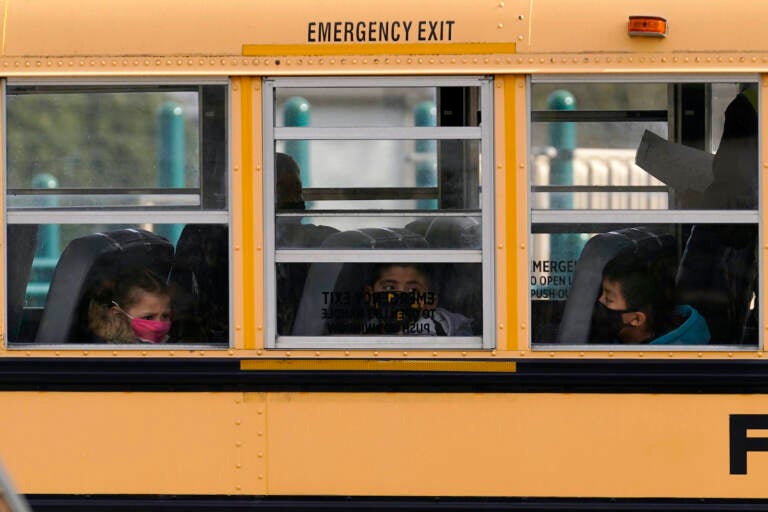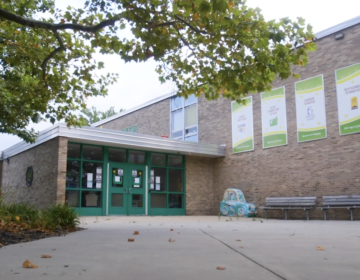Delaware education funding is ‘not adequate.’ A new report calls for an additional $500 million to $1 billion
The report comes after the settlement of a lawsuit that accused the state of being complicit in the disparities experienced by low-income students and others.
Listen 1:17
File photo: A new report recommends adding $500 million to $1 billion in funding into Delaware schools. (AP Photo/Nam Y. Huh)
From Philly and the Pa. suburbs to South Jersey and Delaware, what would you like WHYY News to cover? Let us know!
A long-awaited assessment of Delaware’s education system could result in a push for significant reform.
At the core of the more than 200-page report is a bold proposal to add $500 million to $1 billion in funding into Delaware schools.
The report is the result of the 2020 settlement of a lawsuit that was originally filed in 2018. The suit accused the state of being complicit in the disparities experienced by students from families with low income, students with disabilities, or students who are English language learners.
The settlement between the state, the Delaware NAACP, and others paved the way for the report to offer recommendations for improvement and to address enduring issues, especially those connected to educational equity.
Those recommendations include the following measures:
- Increase state investment in public education
- Distribute more resources according to student needs
- Improve funding transparency
- Allow more flexibility in how districts use resources
- Regularly reassess property values
- Simplify the calculation of the local share provided to charter schools
- Implement a weighted student funding state funding formula
Dwayne Bensing, ACLU of Delaware’s legal director, was surprised by how often the report from the American Institutes of Research emphasized that Delaware is not meeting students’ needs.
“What [was] most shocking to me was how many times AIR said that Delaware’s education system was not adequate, that we were not meeting the needs of our students,” he said. “The report really demonstrates the funding structure that we’ve adapted since the beginning of time really isn’t serving our students in the 21st century.”
“We have this really outdated funding structure that doesn’t really properly quantify the amount of resources that are needed to educate some of our most disadvantaged students, particularly those coming from low-income households, those who are English language learners, and also students who have certain sets of disabilities,” he added.
The report found the state spent nearly $17,000 per student living in high poverty. However, to adequately address the needs of a student facing high poverty, the recommended spending should have been $23,000.
For students with high disabilities, the average spending was slightly more than $18,000, but the recommended expenditure should have exceeded $24,000.
Similarly, students classified as high English language learners incurred costs nearing $16,000, whereas the recommended spending for their needs should have been $20,000.
Bensing notes that for those closely following and engaged with the issue, the problem was already apparent, and the findings simply reinforce the existing facts. He says the core issue has always revolved around funding, and adds that the system operates on a “unit-based structure.”
“The same kind of outdated thoughts about ‘money doesn’t matter’ really needs to be put aside and this report, I think, is one more documentation of peer-reviewed methodological study to say, ‘Yes money matters,’ and we have a system that is not providing enough,” he said. “If you give a quarter to someone to go buy something at the convenience store, it’s not going to be what they choose to buy. It’s just not going to be enough, and right now that’s how we’re funding our education system.”
Delaware Education Secretary Mark Holodick said the report will help state leaders figure out how to update the education funding system considered by many to be out of date.
“We have known change is needed, but we didn’t want to move forward blindly. We needed an independent deep dive into what is working elsewhere, what our own strengths and needs are, and ideas we can consider as a state to move forward,” Holodick said. “We have an opportunity to build upon the numerous initiatives and investments of the current administration, most notably Opportunity Funding, increased early childhood spending, mental health support, and significant compensation increases.”
He said cohesion and connectedness are crucial to tackle all these issues. However, two specific things have caught his attention.
“The need for transparency and for the next finance system that we have for our public schools to be understandable by all parties with calculations that aren’t quite so confusing or unnecessarily complex,” he noted. “I really like the idea of the system having much more flexibility in regard to resource use. I think that is especially important. With that said, if we’re going to add flexibility, I think we need to ensure accountability.”
While making the change in funding is largely the responsibility of legislators in the General Assembly, Holodick said there are others who also have a role to play.
“For our taxpayers in Delaware, they need to be confident that we’re transparent. We’re strategic and thoughtful about how we’re spending tax dollars and that they’re making a difference,” he said. “It’s not my decision. I think it is the decision of Delawareans, those who represent Delawareans in Leg Hall. I think the administration needs to play a role, the department, school boards, leaders in schools.”
State Rep. Rae Moore (D), an educator who also represents the 8th District, said that the House education committee already has a few actions in motion.
“I just ended the second year creating the abundant program in the equity council, we already started the reassessment process as well,” Moore said. “I know that there’s been bills working on addressing special education funding.”
Just as the assessment was conducted in a holistic manner, Moore said, the decision-making should be handled in a comprehensive way.
“In different movements, things are happening to address the inequities. Now that we have this study, now that we have the data, what are we going to do with it next? And that is what I’m looking to do,” she said. “One of my focuses going into next year is really starting to have a holistic conversation about the funding model.”

Get daily updates from WHYY News!
WHYY is your source for fact-based, in-depth journalism and information. As a nonprofit organization, we rely on financial support from readers like you. Please give today.







